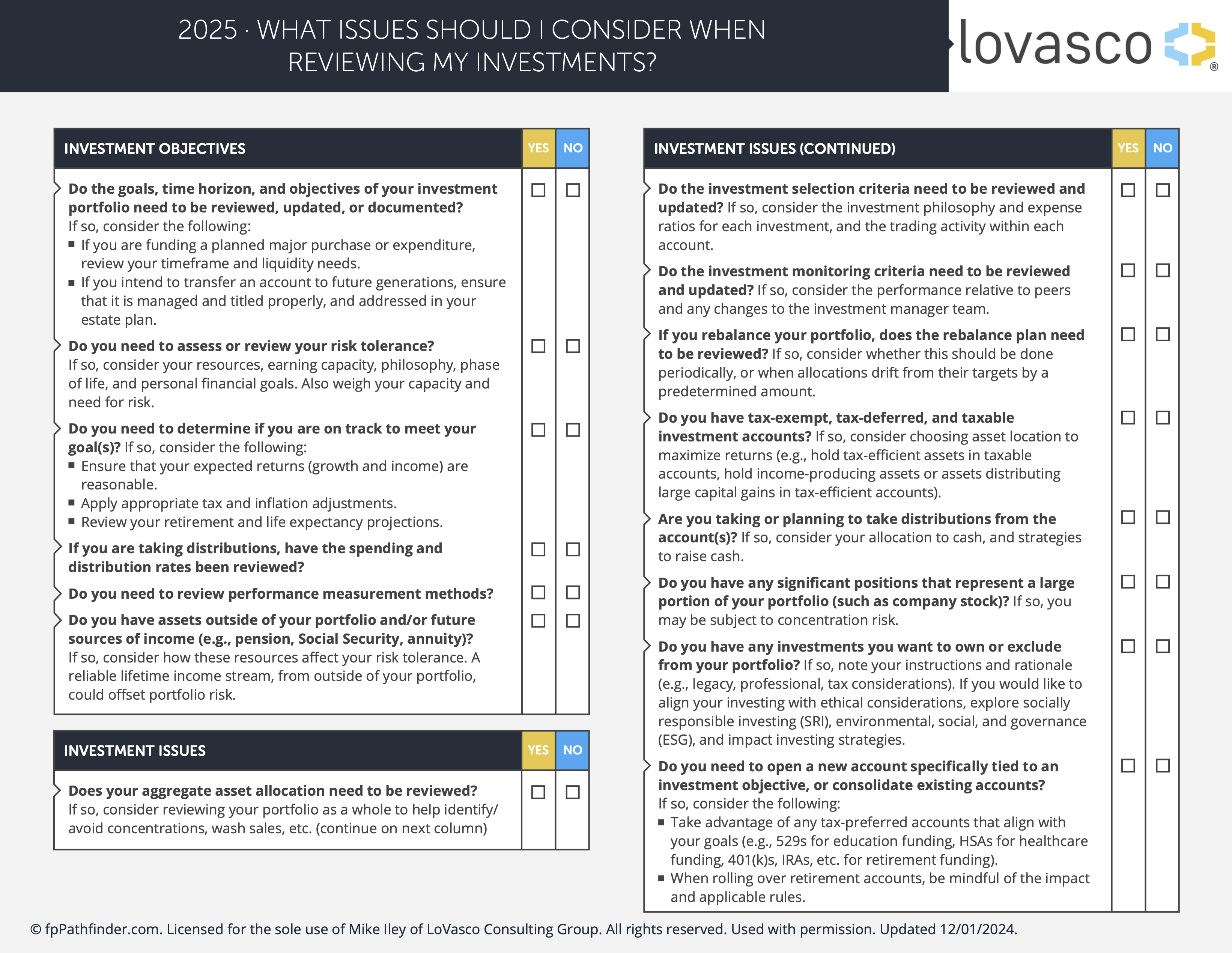What Issues Should I Consider When Reviewing My Investments?

Why Periodic Portfolio Reviews Are Essential—and What to Look For

For most investors, reviewing an investment portfolio isn’t just a good idea—it’s a critical component of a sound financial plan. Whether you’re navigating volatile markets, approaching retirement, or simply refining your financial goals, taking time to evaluate your investments ensures they continue to work in your best interest.
That’s why we’ve created a comprehensive checklist titled, “What Issues Should I Consider When Reviewing My Investments?”—a tool to help clients and prospective clients assess whether their investment strategy is still aligned with their goals, risk tolerance, and current life stage.
Here’s an overview of the key areas this checklist covers, and why they matter:
1. Clarifying Investment Objectives
Before diving into performance metrics or asset allocation, it’s important to revisit your “why.” Are you saving for retirement, funding education, planning a major purchase, or preserving wealth for future generations? Your portfolio should reflect your objectives.
During your review, ask yourself:
- Have my goals or timeline changed?
- Do I need greater liquidity in the near term?
- Is my estate plan aligned with how my investments are titled?
2. Assessing Time Horizon and Risk Tolerance
Your ability and willingness to take risk evolve over time. A newly retired individual’s portfolio will look very different from someone early in their career. Evaluating your current phase of life, income stability, and future needs is crucial to defining your ideal risk profile.
This includes:
- Reviewing how outside income sources (like pensions or Social Security) impact your risk tolerance.
- Confirming your ability to weather short-term market declines while still pursuing long-term growth.
3. Ensuring Proper Diversification and Asset Allocation
Diversification is more than just “owning a little of everything.” A smart allocation strategy looks at your entire portfolio across taxable, tax-deferred, and tax-exempt accounts—and balances growth, income, and preservation.
Ask:
- Does my portfolio include any concentrated positions (such as company stock) that increase risk?
- Has my allocation drifted away from its original targets?
- Is it time to rebalance?
4. Managing for Tax Efficiency
Investment returns aren’t just about performance—they’re also about what you keep after taxes. A tax-aware portfolio can lead to meaningful gains over time.
This part of your review should examine:
- Whether assets are placed in the most tax-efficient accounts.
- How capital gains, losses, and income distributions are being managed.
- Strategies to avoid the 3.8% Net Investment Income Tax (NIIT) or harvest losses in a down market.
5. Monitoring Performance in Context
Evaluating performance requires more than just comparing year-over-year returns. Are your investments performing relative to appropriate benchmarks? Has the fund manager changed? Are the expense ratios still competitive?
Additionally:
- Review how your withdrawal strategy is impacting portfolio longevity.
- Determine whether you’re measuring the right indicators of success based on your personal goals.
6. Addressing Other Investment Considerations
A thorough review also includes some often-overlooked but important details:
- Are you clear on all investment fees and charges?
- Do you have a plan for contributions going forward?
- Is employer stock part of your portfolio—and if so, is it too much?
- Have roles and responsibilities among family members, professionals, or fiduciaries changed?
Take the Guesswork Out of Your Investment Review
Investment planning isn’t a one-and-done task. Life changes, markets evolve, and even small shifts in strategy can yield big results over time. Our downloadable checklist helps ensure you’re asking the right questions and looking at your financial picture holistically.
Whether you're working with us already or are exploring a second opinion, this checklist is a valuable tool for starting the right conversation.
👉 Download the Checklist: What Issues Should I Consider When Reviewing My Investments?
Let us know if you’d like to walk through the checklist together and explore how your investment strategy can support your financial goals.

Is Your Retirement Plan Consultant Actually Doing Their Job?
Take the Self-Assessment to Find Out.
You're responsible for your company’s retirement plan. But with shifting regulations, mounting fiduciary risks, and growing employee expectations, how do you know if you have the right fiduciary oversight and financial wellness process in place?
It takes just 3 minutes
It’s completely free
Receive customized results instantly
Not sure where to start?
15 Questions to Score Your Organization's Benefit Program
See what you are missing.
Confirm where you shine.
Track progress over time.

Not sure where to start?
20 Questions to Score Your Organization's Employee Communications Strategy
See what you are missing.
Confirm where you shine.
Track progress over time.

Subscribe to Our Insights Blog
Receive the latest articles from LoVasco's team of experienced experts on employee benefits and retirement plan best practices.






